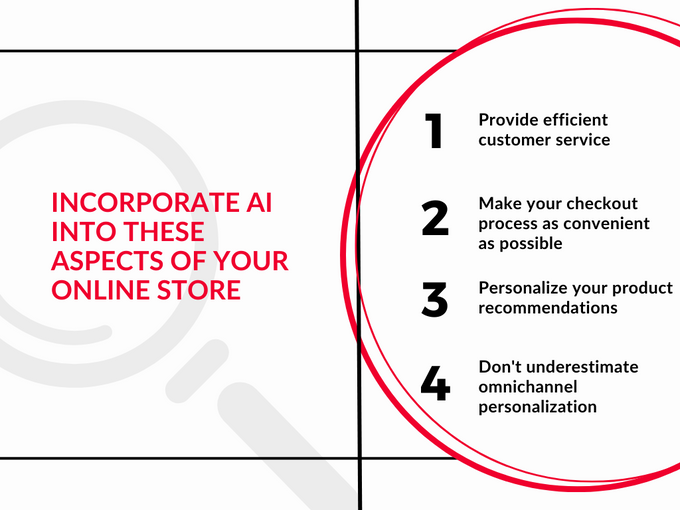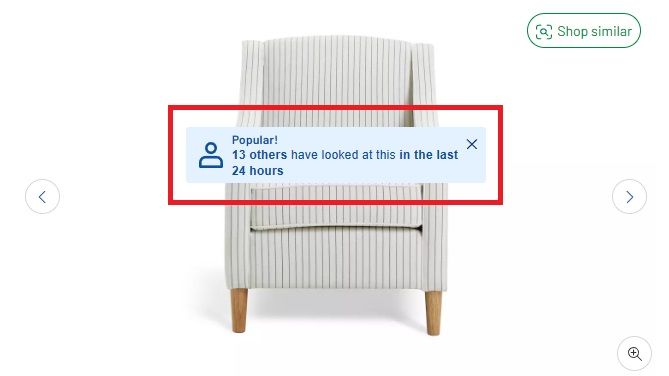Improve Customer Experience With AI: Personalization, Automation, & More
Updated December 15, 2025

AI is transforming the customer journey, ushering in a new era of efficiency and personalization. Over half of all eCommerce companies are already using AI to smooth out their customer care, sales, and marketing operations—with very positive results. Let's delve into the hype around AI and how it can help you improve your customers' experience through personalization, automation, and more.
Meet the Expert
- Jameela Ghann has over 10 years of eCommerce experience. She runs a successful online store, Alora Boutique, and is the marketing manager for Fera Product Reviews.
Using AI to Improve the Overall Customer Experience
There are two main pain points AI should solve for your online shoppers:
- Provide support when they need it
- Streamline all the processes in the customer journey
Nothing can make a customer leave your store quicker than getting frustrated. This includes slow loading times, confusing page layouts, ineffective search bars, getting spammed with marketing material, poor customer service, and no clear contact information.
AI can help you optimize all of these aspects to make sure your customers receive timely assistance and truly feel cared about at every touchpoint.
Let's consider specific aspects and examples you can apply to your own eCommerce business.
» Personalize the customer experience by enhancing your search functionality to improve your website's ranking
1. Provide Efficient Customer Service
Your customers expect only the best service from you. This means quick responses, accurate feedback, and constant availability. But to provide this manually is expensive and impractical. Instead, AI can automate many customer service tasks, especially if they're repetitive. This means:
- You're free to allocate your manpower to other business activities.
- Your customers receive quicker responses, increasing their satisfaction.
Strike Up a Conversation Through Chatbots
The chatbot market is expected to reach $1.25 billion in 2025. Plus, online retail is the one industry where consumers are comfortable to interact with chatbots. Investing in a chatbot can help you improve customers' experience by:
- Being available all the time: AI effortlessly conquers the time zone dilemma and can address customer queries 24/7.
- Eliminating waiting periods: As a human, you can address only one customer query at a time. A chatbot can process multiple requests simultaneously.
- Giving accurate and instant responses: A chatbot provides answers in real-time and removes instances of human error.
- Offering multi-lingual support: 65% of your shoppers prefer communicating in their own language, a service a chatbot can easily provide.
Worried about a chatbot being too impersonal or faceless?
You can still automate customer service processes without losing the human touch. By combining natural language processing (NLP) with customer data, you can give each customer a personalized experience.
At Fast Simon, our chatbot can put you in contact with an account specialist directly. No phone call—start chatting immediately or book a time that suits you.
2. Make Your Checkout Process as Convenient as Possible
The average global shopping cart abandonment rate is 70%. One of the top reasons for this is the checkout process takes too long.
AI and personalization can help reduce abandoned carts. Autofill is an excellent AI feature that auto-populates forms with information. This saves your customer effort, especially if it's things like filling in a delivery address, credit card information, or contact details.
You can also personalize your customers' checkout by suggesting relevant upsells and cross-sells. This way, your customers may discover new products and increase their average order value.
Princess Polly clearly labels their product recommendations. The "Quick Add" function lets you add any of these products without leaving your current screen. Plus, there's also an "Express Checkout" option that lets you pay directly with your Shop Pay, Amazon, or PayPal accounts—meaning you don't have to create an account and add all of your information manually.
3. Personalize Your Product Recommendations
AI's prowess lies in its ability to analyze customer behavior and predict preferences, making it the ideal tool to personalize product recommendations. This anticipatory approach not only enhances the customer experience but also boosts the likelihood of conversions. Over 50% of your customers are more likely to buy if they see personalized content.
We've already discussed adding personalized product recommendations to the checkout process. Another approach is behavior-based triggers. AI can send personalized pop-ups to your customers. This can be based on:
- Location: "250 people from your city just bought [x]"
- Product: "10 people just added [x] to their basket" or "A customer just bought [x] with [a related product]"
Argos adds pop-ups on their product pages. These can range from how many customers have viewed the product to how often it was purchased in the last 24 hours.
4. Don't Underestimate Omnichannel Personalization
Creating a unified customer experience is important. Remember, your customers don't just interact with you on your store, but through social media, email, and apps too. To make sure they receive a consistent, personalized experience on each channel, you should invest in omnichannel personalization.
While it may sound intimidating to juggle all of that data, AI can help you manage omnichannel personalization:
- Data collection and analysis AI can help you collect and analyze customer data so you can efficiently segment your audience according to their preferences and behavior.
- Predictive analysis Based on your data and segments, AI can predict shopping behavior. This allows you to make personalized recommendations and prepare for any surges or new trends.
- Real-time personalization AI can interact with customers in real-time and deliver in-the-moment personalized content. Plus, by combining AI with NLP, it can understand customer feedback and help you refine your personalization strategies.
- Consistency across all channels AI helps maintain consistency in messaging and branding across various channels by automatically adapting content to fit the specific context of each channel.
Challenges and Ethical Considerations Regarding AI
While AI-powered merchandising and customer service tools bring immense benefits, they also have challenges:
- Integration with your existing systems is crucial for your operations to run smoothly.
- Bias in algorithms can occur which means you're excluding one or more segments from your target audience.
- Addressing privacy and ethical concerns is paramount. You have to protect your customers' data and be transparent about how you collect, store, and use it.
Get in the AI Fast Lane to Improve Customer Experience
In the ever-evolving landscape of eCommerce, AI emerges as a pivotal force that reshapes the customer journey. From personalized recommendations to efficient customer service and beyond,
AI paves the way for a future where seamless experiences are the norm. By harnessing AI's potential and addressing its challenges responsibly, you can unlock the power of enhanced customer journeys in the digital realm.










